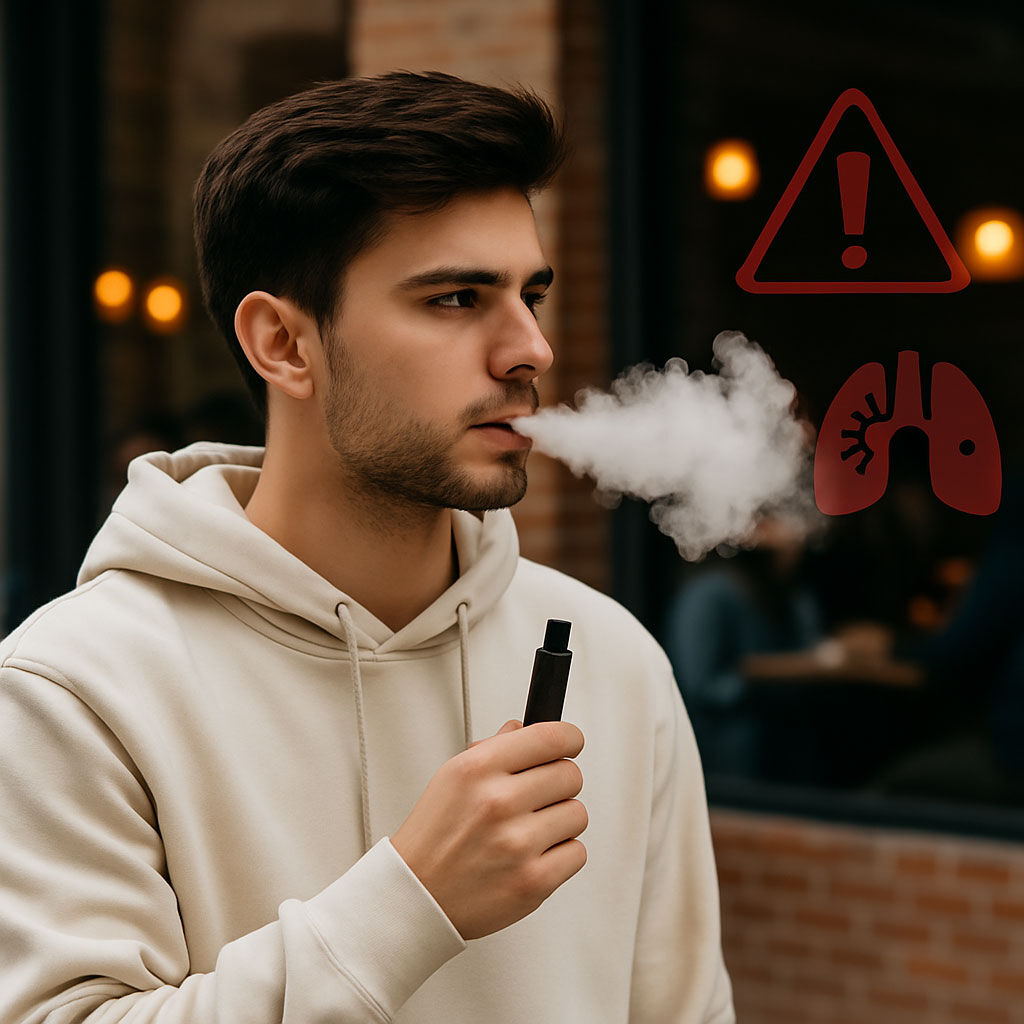Contrary to conventional cigarettes and the multitude of harmful chemicals, people will always tend to ask How does vaping affect you. While not completely safe, there are still short-term and long-term effects that are important to understand. The amount of nicotine, the device you're using, and the frequency all play vital roles in the overall impact on the user. This article will walk through how vaping affects you, from the physical sensations to the social and lifestyle changes it brings.
Short-Term Effects of Vaping
When someone first tries vaping, the short-term effects are usually the most noticeable. A sudden nicotine buzz, throat hit, or coughing can happen if the nicotine strength is higher than the body is used to. Users also report dry mouth, dizziness, or mild dehydration. These immediate effects are tied to how quickly nicotine enters the bloodstream, which can be seconds after inhaling.
Nicotine stimulates receptors in the brain that release dopamine, creating a temporary sense of alertness or relaxation, depending on the user. That's why some people report feeling calm, while others feel slightly jittery or lightheaded, especially on higher strengths.
There are also physical side effects such as:
-
Dry mouth and throat irritation: Caused by propylene glycol (PG) in vape juice, drawing in moisture.
-
Increased heart rate: Nicotine acts as a stimulant, raising heart rate within minutes.
-
Coughing: More common for beginners who inhale vapor differently than cigarette smoke.
-
Nausea or dizziness: Especially likely when trying a high-strength nicotine salt device.
For a more detailed breakdown of immediate issues, check out our post on the Side Effects of Vaping. It covers both minor and more concerning reactions that some users experience early on.
Long-Term Health Effects
The bigger question for many people is what happens after months or years of vaping. While vaping avoids tar and many carcinogens from cigarette smoke, research has shown several long-term health considerations:
-
Nicotine Dependence: The most documented effect is addiction. Regular vaping rewires the brain's reward system, making it harder to go without nicotine. Our article on How to Stop Vaping on 5% nicotine explains what withdrawal looks like and strategies for reducing dependence.
-
Respiratory Health: Studies have found that inhaling vapor can cause airway inflammation and reduced lung function over time. This doesn't necessarily mean vaping is as damaging as cigarettes, but it does suggest that heavy use can affect breathing and exercise tolerance.
-
Oral Health: Vaping can dry out the mouth, which reduces saliva and raises the risk of gum problems. Flavorings can also irritate gums and enamel. Our article How Does Vaping Affect Teeth explores discoloration, gum irritation, and other oral issues.
-
Cardiovascular Effects: Nicotine increases blood pressure and heart rate. Long-term, this can stress the cardiovascular system. While vaping doesn't deliver carbon monoxide like cigarettes, the stimulant effect of nicotine is still a concern.
-
Chemical Exposure: Though fewer than in cigarettes, vape aerosols still contain metals (from coils) and chemicals from flavorings. Chronic exposure could increase risks not fully understood yet, which is why research is ongoing.
What makes long-term effects more complex is that they vary by device and e-liquid. Someone vaping low-strength freebase nicotine at low wattage may face fewer long-term effects compared to a user taking thousands of puffs from high-strength salt nic disposables every week.

Nicotine Dependence and Strength
Nicotine strength is one of the most significant factors in how vaping affects you. Many disposables and pod systems are made with salt nicotine, which delivers higher strengths with a smoother inhale. A 5% disposable can feel very different from a freebase e-liquid at lower levels. If you're unsure what strength matches your needs, read How to Choose the Right Nicotine Strength for Your E-Liquid.
Nicotine doesn't just affect the body; it also impacts mental health. The release of dopamine reinforces the cycle of craving and satisfaction, which is why people can feel restless or irritable when they don't vape for a while.
Vaping vs. Smoking
Another way to look at vaping's effects is by comparing them to traditional cigarettes. Vaping doesn't produce tar, ash, or carbon monoxide, which makes the experience feel lighter. But nicotine dependence is still present. Our post on Vaping vs Smoking gives a breakdown of how the two compare, from cost to health.

Device and Experience
Different devices affect users differently. For example, sub-ohm vaping creates big clouds with lower nicotine, while pod systems and disposables focus on higher nicotine with less vapor. Devices also affect how discreet or convenient vaping feels. If you're curious about newer devices, read How Do Rechargeable Disposable Vapes Work to learn how they extend the life of disposables.
Large puff devices are another trend. They change the rhythm of use since they last longer and deliver more nicotine per unit. Our breakdown of the Pros and Cons of Using Large Disposable Vapes explains the tradeoffs.
Lifestyle and Social Effects
On the contrary, vaping may affect you more than you think. Affecting your daily routines and social settings, some may feel that vaping may be more socially acceptable due to the lack of lingering smoke smell. However, it's also restricted in many public places. Traveling with devices is another layer. If you're flying, our TSA Guidelines blog covers what you need to know before packing your vape.
There's also the cultural side. From competitive cloud chasing to niche communities around devices, vaping has created its own subculture. That can be positive for some users, but it also introduces peer pressure and trends that may push people toward heavier use.
Quitting and Behavioral Changes
How vaping affects you also depends on how easy or hard it is to stop. Some people transition away from nicotine gradually, while others find themselves stuck in cycles of withdrawal. If you're interested in reducing your intake, see our guide on How to Stop Vaping on 5% nicotine. It also covers the role of sleep, nutrition, and exercise in easing the process.
Final Thoughts
So, how does vaping affect you? The answer depends on your body, your habits, and the device you choose. While short-term effects can often feel light, long-term effects shouldn't be overlooked. Nicotine dependence and oral issues may prove to be an issue in years to come. Understanding the physical, mental, and social sides of vaping will enable you to make more informed decisions.




Leave a comment
All comments are moderated before being published.
This site is protected by hCaptcha and the hCaptcha Privacy Policy and Terms of Service apply.